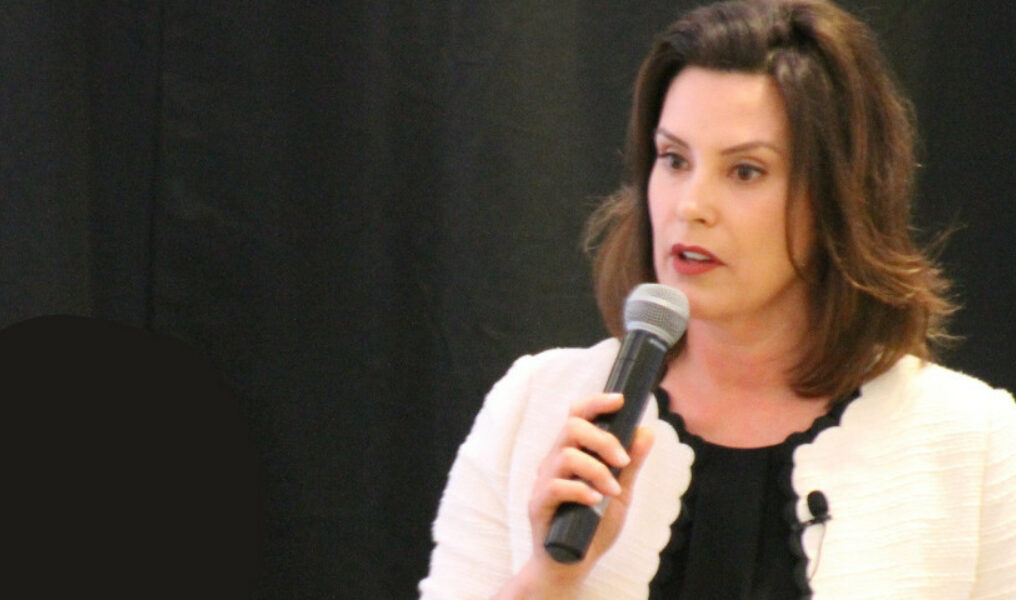What We Learned About the Seven Candidates Vying to Be the Next Governor
NEWS ANALYSIS
Come Jan. 1 there will be a new governor, but for now, there are seven competing for the position. And, with all seven people vying to occupy the office sitting on a simple stage in East Lansing May 10, one would expect a clash of ideas and a battle of wills. But, the four GOP and three Democratic candidates answered questions for the Michigan Press Association with relatively few bumps.
There was a cantankerous and divided Republican field — consisting of Attorney General Bill Schuette, Lt. Gov. Brian Calley, State Sen. Patrick Colbeck and Dr. Jim Hines. On the Democratic side, they heard a Bernie Sanders' like rally call by Dr. Abdul El-Sayed, a reserved and middle-of-the-road former Sen. Gretchen Whitmer and a billionaire on a vanity tour, Shri Thanedar.
Here are some key takeaways:
Trump-mancing
The GOP candidates don't agree on much except their undying devotion to President Donald Trump. In fact, despite Trump's endorsement of Bill Schuette, the candidates are still vying to wrestle that endorsement from the attorney general's hands to clutch it for themselves.
On May 9, on a debate produced by WOOD TV 8, Colbeck made a plea for Trump to "reconsider" his endorsement of Schuette. Hines in both his appearance on the television debate and the MPA conference made the case that he was for "always Trump" because he saw him as disruptive as an outsider. Schuette, meanwhile, smacked Calley around verbally for withdrawing his support of then-candidate Trump when the infamous "Access Hollywood" tape surfaced. That's the tape where Trump is heard discussing grabbing women by their privates and forcing himself on them. At the time, Calley said he would be unable to vote for Trump and would write in Pence. He ultimately voted for Trump he said.
Colbeck argued Trump should rescind his endorsement of Schuette and instead give it to Colbeck.
The only high-profile endorsement given and withdrawn so far, however, has been Fox News host Sean Hannity's endorsement of Colbeck. More on that later.
The candidates also showed a partisan divide between whether the media was treating Trump fairly. Colbeck accused the media of doing "Mad Lib" reporting.
"A lot of stories that I found get written about different events are actually more like a 'Mad Lib' where people have actually filled in the adjectives," Colbeck said. "The story's already written, the tone's already set, and for me that's disconcerting because our republic depends upon the people who are electing people into office getting good information."
Calley said he is troubled by the reliance on unnamed sources.
"It's a gotcha-type of reporting, it tends to lead with conjecture and unnamed sources at a level that I've never seen before," he said. "And what I've come to tell people when I'm asked about some sort of a sensational story about Donald Trump is, you have to wait 24 to 48 hours because in most cases there's other information that comes out that provides a more balanced view on what happened. And I think it's unfortunate because the media does have such an important role to play in our democracy, we're talking about first amendment rights here."
Schuette, for his part, accused the national media of being "elites."
"These are the same elites that look down on the heartland of America in terms of the nitty gritty tough plumbers and electricians and builders, the folks that built this state and the folks that need to rebuild our infrastructure as well," he said. "They look down on people who work."
Meanwhile, Democrats Whitmer, Thanedar and El-Sayed said they thought that Trump was being covered fairly. El-Sayed however offered a more nuanced analysis of coverage of Trump.
"I think the right question is, is somebody who occupies the highest office in the land fair to the media? Because when you go around calling the media fake news, when you go around destabilizing what is truth from falsehood, you have to ask yourself, what actually is truth anymore?" El-Sayed said. "I respect deeply the work that you do, because you've got to tell the story. There is no democracy without a free press, and when you have a president attacking that very institution of a free press, you have to ask yourself, where are we as a society?"
The whole question of how fair the media is also feeds another important issue: Transparency.
Transparency
Here's the deal: Michigan has consistently gotten poor scores on governmental transparency. The state legislature and the governor's office are both exempt from the Freedom of Information Act, while the judiciary, which is tapped to fill certain countywide posts when they are vacant, is not subject to the Open Meetings Act.
And just how much do the various candidates have in the bank? Who do they owe money to? What property do they own? None of that is required for disclosure either under Michigan law.
The candidates all agreed that transparency was important, but the reality of transparency offered by the candidates is blurry at best. This issue also opened the door for an attack by Calley leveled against Schuette.
"Not only have I released my tax returns, but I did complete the federal form. And, I just want to point out the hypocrisy here," declared Calley. "Why put out a tax return but not the federal form? Why do you have to wait for a law to pass? What is it that's being hidden? What we have heard is that they can't really put out a financial disclosure, Bill Schuette cannot put out a financial disclosure form because he put all of his assets into a blind trust, that's been the story. But, it appears that though, we've been directing the purchase transfer of millions of dollars in offshore assets while attorney general."
Schuette declared he'd happily release his tax returns, but was refusing to fill out a federal disclosure form. Calley jumped on that, noting it was likely because Schuette's assets were supposed to be in a blind trust and without his involvement. Calley raised the issue of millions of dollars of property owned by a company listed at Schuette's Midland address. The property is located in the U.S. Virgin Islands and has been sold.
Crains Detroit reported that not only had it been sold, but that Schuette used employees of the attorney general's office to witness and notarize the property transaction paperwork. Schuette has also been under pressure for allegedly hiring political operatives on the state's dime.
Schuette denied the allegations, calling Calley "desperate."
"Now listen, Brian you go around the state," Schuette said. "You go around the state making false accusations that are not true. All my assets are in a blind trust, I comply with that fully and completely. And I've released my income taxes for the last seven years, I do so again this eighth year as attorney general. And you're so desperate, you're so behind there's nothing you won't do to try to make false accusations and attacks."
Another contention was the issue of FOIA application. The candidates all said they said supported extending the law, which allows citizens to access government documents, to the legislature and the governor's office.
But here is where Schuette, again, fell short. While talking about his compliance with FOIA as attorney general, he failed to note that he is currently being sued by Progress Michigan, a liberal activist group, for using private emails to avoid FOIA.
This division and hammering by Schuette and Calley on each other could result in a door opening for Colbeck to garner the nomination of the GOP come August. He's a relatively unknown statewide, and as a former, literal, rocket scientist, presents some policy solutions the Detroit News has said have merit.
Islamophobia
But that alleged merit in his policy solutions should be clouded over by his blatant Islamaphobia and outright drive for a Christian government. This straddles the transparency issue a little because Colbeck was upset that Buzzfeed News reported on his claims that Muslims were undertaking a "civilization jihad" to impose sharia in America.
In the speech highlighted by Buzzfeed, he claimed El-Sayed was part of this modern day boogeyman conspiracy. The Detroit News called his "evidence" thin, at best.
"I have very deep concerns around that obviously," Colbeck told the gathering of journalists. "Regards to Dr. Abdul El-Sayed, you've got a handful of affiliation with Muslim Students' Association, which has been identified as an affiliated organization in that Explanatory Memorandum. And if you guys go off and look at Muslim Students' Association across the nation, you'll find that they've had Al-Qaeda leaders speaking to their people, and they've also found out that … So there's some serious concerns around that, and frankly, this is one of those areas that got me ticked off in regard to the fairness of the media. They pitch this as a comment around concerns around ties to the Muslim Brotherhood as a concern with Muslims in general."
Each of the candidates were asked if they thought sharia was a threat to Michigan or America. Interestingly, the GOP candidates noted that the courts understood their role and would never impose it. But the Democrats grasped on the question and Colbeck's role in promoting it alongside Kamal Saleem, whose claims to have been a member of the Muslim Brotherhood before converting to Christianity are questionable at best.
Thanedar called it "bigotry."
Whitmer went further.
"I'm really horrified that so many people use issues like this to divide us," she said. "The greatest strength of our state is the rich diversity of our state. We want to make sure that this is a place that people come to for opportunity so we hand grow our population so we can diversify our economy."
But perhaps it was El-Sayed who hammered it home the hardest.
"Here's the thing, one of the biggest frustrations that I've had is that the assumption that there should be some sort of association between me and some dastardly group, functions simply upon the fact that I choose to pray a particular way," he said. "It is implicit that it used to raise the specter that has everything to do with that concept … what frustrates me more is not that you have blatant racism on the part of certain people. But in the words of Martin Luther King, 'One of the most dangerous aspects is not when bad people speak out, it's when good people fail to speak up.' And what I have not heard is the Republicans on this panel, decisively and swiftly, call out this kind of Islamophobia, this kind of racism in the context that they are running to represent the state that has the highest per capita number of Muslim-Americans in the country."
Colbeck, who has backed resolutions calling on the state to ignore the marriage equality ruling from the U.S. Supreme Court, assured El-Sayed he had no ill will toward Muslims.
"I love Muslims," Colbeck said. "It's not an issue, the issue is terrorist organizations like the Muslim Brotherhood."
El-Sayed shot back; "Now you might not hate Muslims, but I'll tell you Muslims definitely hate you."











